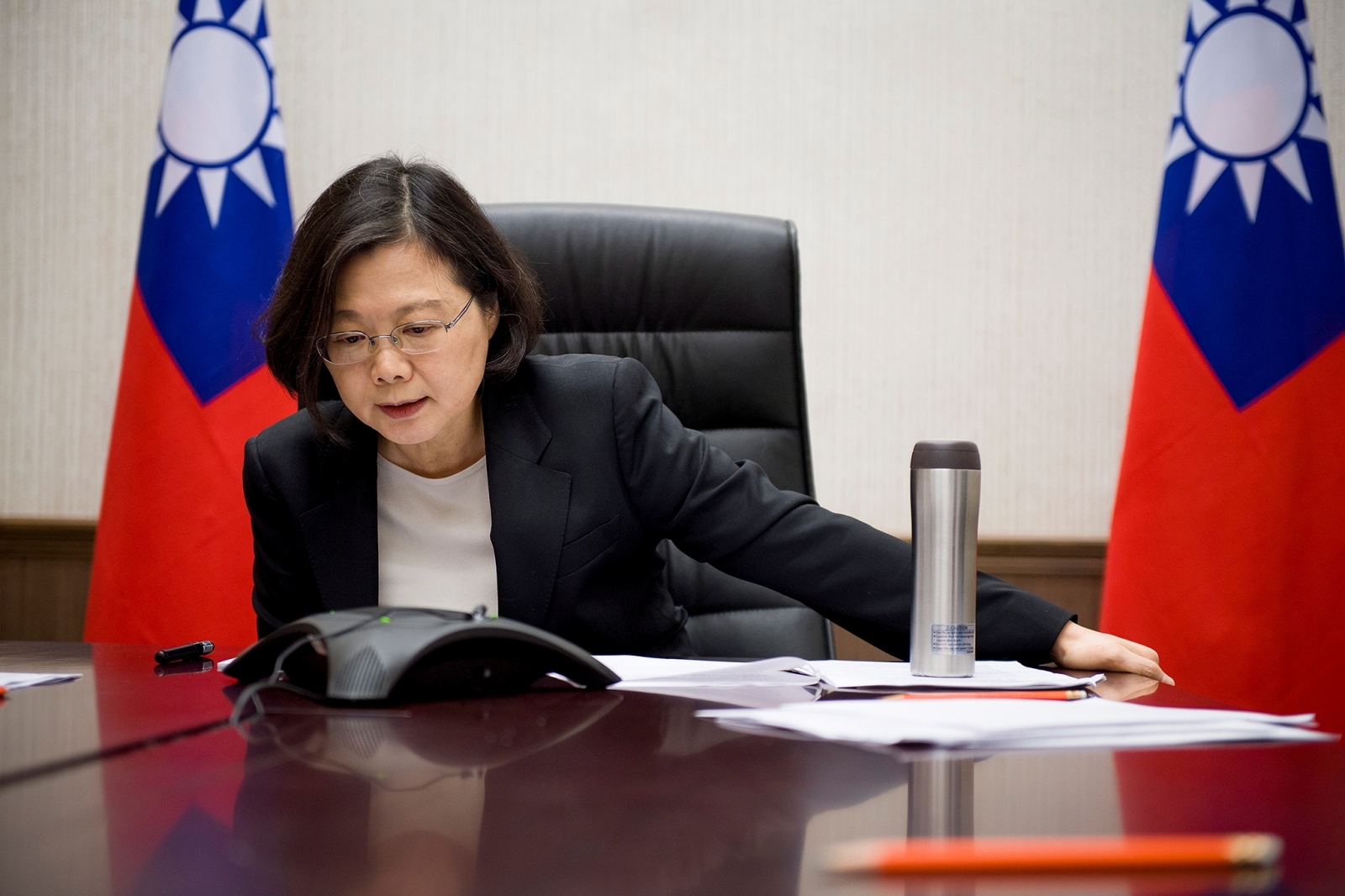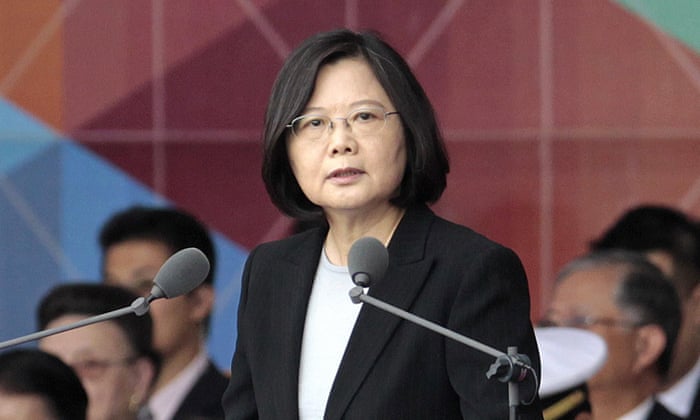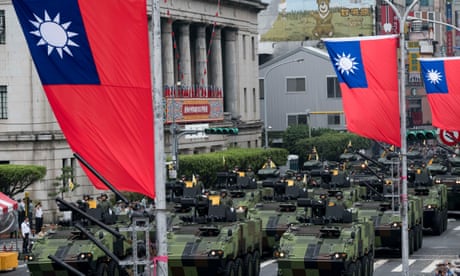It should not surprise anyone if President Trump's advisers meet with President Tsai.

BEIJING — President Tsai Ing-wen pledged to bolster Taiwan's international profile as she set off on a trip to reinforce relations with diplomatic allies in Central America, a task that has taken on new urgency as Beijing ramps up efforts to diplomatically isolate Taipei.
Speaking to reporters before her departure, Tsai said the visits to Honduras, Nicaragua, Guatemala and El Salvador would "show the international society that Taiwan is a capable and responsible partner for cooperation."
She will transit through Houston and San Francisco.
Beijing regards the self-governing island as part of China and officials complained after President Donald Trump last month spoke by phone with the Taiwanese leader.
By THE ASSOCIATED PRESS

BEIJING — President Tsai Ing-wen pledged to bolster Taiwan's international profile as she set off on a trip to reinforce relations with diplomatic allies in Central America, a task that has taken on new urgency as Beijing ramps up efforts to diplomatically isolate Taipei.
Speaking to reporters before her departure, Tsai said the visits to Honduras, Nicaragua, Guatemala and El Salvador would "show the international society that Taiwan is a capable and responsible partner for cooperation."
She will transit through Houston and San Francisco.
Beijing regards the self-governing island as part of China and officials complained after President Donald Trump last month spoke by phone with the Taiwanese leader.
Trump raised further concerns in Beijing when he questioned a U.S. policy that since 1979 has recognized Beijing as China's government and maintains only unofficial relations with Taiwan.
U.S. lawmakers often meet with Taiwanese presidents when they transit through the U.S. — most recently in June, when Tsai met in Miami with Republican Sen. Marco Rubio of Florida.
This time, it was not clear if Tsai would meet Trump, though some observers said a meeting with Trump's transition team could happen.
"It should not surprise anyone if the president's advisers who will be working on Asia policy meet with President Tsai," said Ross Feingold, a Taipei-based senior adviser at D.C. International Advisory, a consulting firm whose chief executive has been consulted by the Trump transition team.
"China might issue its usual statements of displeasure ... but it really doesn't depart from precedent," Feingold said.
U.S. lawmakers often meet with Taiwanese presidents when they transit through the U.S. — most recently in June, when Tsai met in Miami with Republican Sen. Marco Rubio of Florida.
This time, it was not clear if Tsai would meet Trump, though some observers said a meeting with Trump's transition team could happen.
"It should not surprise anyone if the president's advisers who will be working on Asia policy meet with President Tsai," said Ross Feingold, a Taipei-based senior adviser at D.C. International Advisory, a consulting firm whose chief executive has been consulted by the Trump transition team.
"China might issue its usual statements of displeasure ... but it really doesn't depart from precedent," Feingold said.
"A meeting with Trump would be the biggest precedent changer."
Regardless, Tsai is likely to keep the U.S. stops low-key to avoid further inflaming tensions with China, which has been angered by Tsai's refusal to endorse Beijing's concept that Taiwan and the mainland are part of a single China.
Regardless, Tsai is likely to keep the U.S. stops low-key to avoid further inflaming tensions with China, which has been angered by Tsai's refusal to endorse Beijing's concept that Taiwan and the mainland are part of a single China.
In late December, in what Beijing called routine exercises, China's first and only aircraft carrier and a fleet of warships sailed past Taiwan's south, prompting Taipei to deploy fighter jets to monitor the fleet.
In Central America, Tsai will focus on strengthening ties with allies to fend off Beijing's efforts to draw governments away from Taipei and further diminish its global presence.
In Central America, Tsai will focus on strengthening ties with allies to fend off Beijing's efforts to draw governments away from Taipei and further diminish its global presence.
Beijing and Taipei have competed for allies for much of the nearly seven decades since the end of China's civil war in 1949, when the defeated Nationalist government fled across the Taiwan Strait.
Tsai, who is leading a delegation of 120 people, will meet with most of the four countries' leaders and attend the inauguration of Nicaraguan President Daniel Ortega.
Tsai, who is leading a delegation of 120 people, will meet with most of the four countries' leaders and attend the inauguration of Nicaraguan President Daniel Ortega.
She said she would also interact with the heads of state of other countries at the inauguration.
Beijing has intervened to prevent the island's participation in international forums and established diplomatic relations with former Taipei allies Gambia and Sao Tome and Principe.
Beijing has intervened to prevent the island's participation in international forums and established diplomatic relations with former Taipei allies Gambia and Sao Tome and Principe.
The moves have been seen as effectively abandoning the unspoken diplomatic truce that lasted eight years under Tsai's China-friendly predecessor.
Just 21 countries and governments, mostly in Latin America and the Caribbean, now have official ties with Taipei.
Observers were watching to see if any of the four Central American nations might defect despite Tsai's efforts, but say stronger U.S. support under Trump's administration would help balance future diplomatic losses.
"We should expect that in the Trump administration the U.S. would be more vociferous and emphatic about Taiwan's participation in international organizations," Feingold said.
Washington remains Taiwan's main source of weapons, with $14 billion in approved arms sales since 2009, and is bound by law to consider threats to the island's security a matter of "grave concern."
If Beijing aggressively pursues existing Taipei allies, leveraging its growing economic, military and political clout, the competition could prove too expensive for Taipei and prompt Tsai to seek even deeper ties with the U.S.
"She may think now that it's America or bust," said Sean King, a Taipei-based senior vice president at consulting firm Park Strategies.
Observers were watching to see if any of the four Central American nations might defect despite Tsai's efforts, but say stronger U.S. support under Trump's administration would help balance future diplomatic losses.
"We should expect that in the Trump administration the U.S. would be more vociferous and emphatic about Taiwan's participation in international organizations," Feingold said.
Washington remains Taiwan's main source of weapons, with $14 billion in approved arms sales since 2009, and is bound by law to consider threats to the island's security a matter of "grave concern."
If Beijing aggressively pursues existing Taipei allies, leveraging its growing economic, military and political clout, the competition could prove too expensive for Taipei and prompt Tsai to seek even deeper ties with the U.S.
"She may think now that it's America or bust," said Sean King, a Taipei-based senior vice president at consulting firm Park Strategies.
"She's probably going to lose these peripheral countries eventually anyway, so why not go for the gusto and get as close to the U.S. while she can?"


